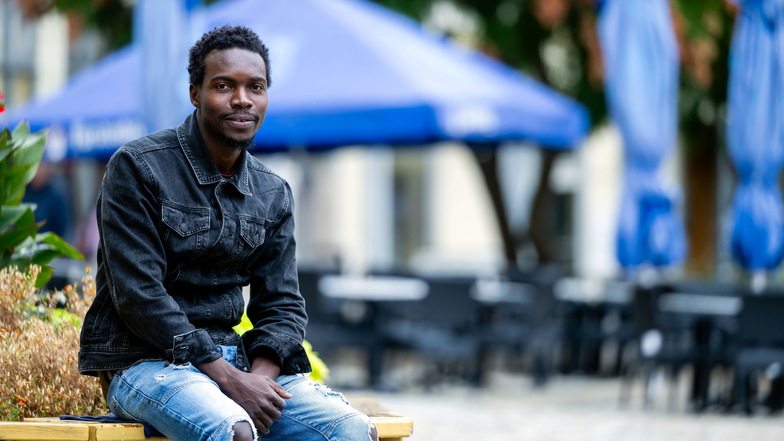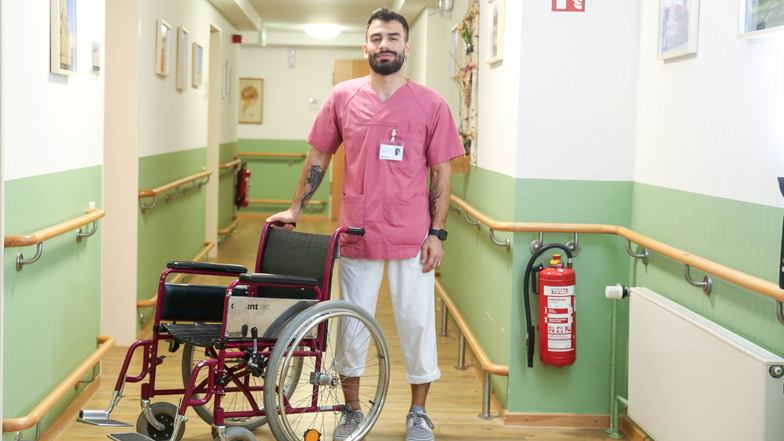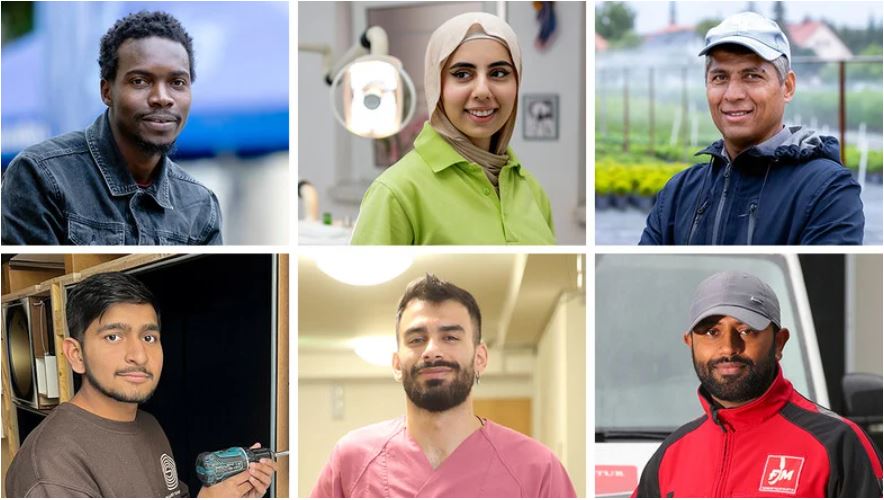From Tim Ruben Weimer
Bautzen. Learning the language, getting recognition and a work permit, having their school-leaving qualifications recognized or catching up on them, writing applications, finding accommodation, completing internships - the road to their first job is a long one for many refugees who come to Germany.
Initiatives like the Labor Market Mentors, refugee associations such as Welcome to Bautzen or Migration counseling centers such as those run by Caritas and their employees are often key intermediaries between employers and refugees. Six examples of how refugees in the Bautzen district have successfully gained a foothold in the labor market.
Driver for Pulsnitz delicatessen
The 28-year-old Pakistani Muhammad Eissa feels at home in Großröhrsdorf. He gets along well with his colleagues at the salad manufacturer "Frisch und lecker" in Pulsnitz, for whom he works as a driver. Every Sunday, he is invited to coffee with a former work colleague and his family in the village. He notices, however, that the mood toward foreigners in Bautzen is quite different than on his delivery trips to Dresden. "I speak good German, I also understand what they say about us," he says.

When he dropped out of his finance studies in Pakistan at the end of 2015 and fled to Germany, the chances of him staying were poor, he reports. The fact that he spoke good English and taught himself German via the Internet helped him find his first internship. He had his first employment contract in his pocket just one year after his arrival - by chance: a man had approached him at the Bautzen train station and recommended his son's timber company.
Trainee mechatronics technician for refrigeration in Bautzen
For Bai Ibrahim Drammeh from The Gambia, the search for a job took much longer. When he came to Germany in 2017 at the age of 18, he first caught up on his secondary school leaving certificate and joined one of the DaZ classes at a vocational school in Hoyerswerda. After that, it took until March 2023 for him to get his work permit. In September, he began training as a mechatronics technician for refrigeration in Bautzen. In between, he worked in the building services department of the asylum home in Hoyerswerda where he lived.

"I'm really interested in this apprenticeship, I want to know how these things work and do something manual," he says. "I've experienced that school in Germany is hard, but I now trust myself to manage it," says the 24-year-old.
Journeyman at a joinery in Bautzen
Raj Patel from India came to Bautzen with his parents in 2015 at the age of 13. He completed his secondary schooling here and received a work permit at the age of 18 - in contrast to his parents, who are now only living in Germany with toleration.

Through an acquaintance, he got an internship at the Schuster joinery in Bautzen, which offered him an apprenticeship in 2020. 2023 year he completed his journeyman's examination. "Working as a carpenter is fun," says the 21-year-old, but he wishes he could finally stop living in the refugee home in Kamenz.
And he is worried about the future of his parents: Unlike him, he says, they didn't learn German because they never had schooling. "You would have to start with them as with a toddler," he says. He says his father was offered a job at a restaurant in Kamenz, but he is not allowed to work there without a work permit. If they don't get a residence permit soon, they face deportation.
Gardener at a nursery in Bautzen
43-year-old Nuri Habib from Afghanistan has been working at the Sämann tree nursery in Bautzen for more than three years. But the road to his first job was difficult after he came to Germany in 2016. He sent out more than 50 applications at the time, he recalls, to which he never received a response.

"But I liked it here in Bautzen, I have a small garden here and I can bike to work or explore the whole city in 15 minutes." With xenophobia, however, things have gotten worse in Bautzen in recent years, he believes. "Many of my friends have left the city because they experienced racism frequently and in public places."
In every country there are people who work and those who don't want to work, he says. And it's the same among foreigners, he says. "I just want to be able to walk the streets here in peace without being insulted." But he has also experienced a lot of positive things. His colleagues at work and his boss in particular have been very friendly to him - he has even helped him move several times.
Nurse in Kamenz nursing home
"The young man is really good, so loving and caring to the elderly." The director of the St. Monika care facility in Kamenz, Andrea Spittank, is enthusiastic about her Kurdish apprentice Araz Salehzadeh. He came to Germany from Iran in July 2019 and found his way to Malteserstift in Kamenz via an FSJ. There he also completed training as a nursing assistant. "When my patients call me nurse, I say that I am not a nurse, but a nurse brother," the 24-year-old Salehzadeh says. "I am a brother who wants to give back to this society."

When he came to Germany, he taught himself the language through children's books because he was not given a German course, he says. "It eased my homesickness that I got to know new people and a new culture and language." In March, Salehzadeh won third place at the German championships in ju-jutsu, a Japanese martial art of unarmed self-defense, for the Kamenz Police Sports Club. Now he is doing a second apprenticeship as a nursing specialist - and is allowed to shorten it from three to two years due to his good performance.
Dentist helper in a Bautzen practice
Lilas Masri came to Germany from Aleppo in Syria eight years ago and graduated from secondary school here. She completed an apprenticeship as a dental assistant with Sebastian Reiche, a dentist from Bautzen. "The training was not easy, but it would have been even more difficult if the team had not been so supportive of me," says the 20-year-old. She is now employed as a dental assistant and also performs group prophylaxis together with her boss, she says.

"It makes me sad that I only ever hear bad news about refugees. Many think that we are just sitting around. Yet many refugees have also found jobs or training. I pay taxes now just like everyone else." As a headscarf wearer, she wishes she could work anywhere in the future without having to go through the racist experiences that many of her friends have had.








